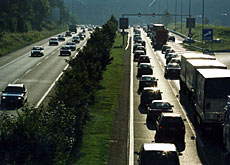Commuter nation chooses the car

The Swiss have become a nation of commuters, and most prefer taking the car to work rather than using public transport.
Two studies released on Tuesday show that the number of commuters has more than doubled since 1970, and that increasing numbers live and work in different cities.
The information, compiled by the Federal Statistics Office, is based on the population census of 2000.
Six out of ten people work outside the municipalities in which they live, and although most travel further to work in terms of distance than they did in the 1970s, average journey times have remained the same (22.9 minutes).
The studies found that the government’s policy of encouraging the use of public transport is not working, at least as far as commuters are concerned.
Some 58 per cent travel to work from out of town, compared with 48 per cent 20 years ago. Just 21 per cent use public transport to get to work.
Fritz Wegelin, vice-director of the Federal Planning Office, told swissinfo that cities bear the brunt of the influx of cars.
“In urban centres, where two-thirds of Swiss live, there is too much traffic and quality of life suffers.”
Lost customers
The Federal Railways has seen a small increase in passenger numbers, but other forms of public transport, including buses and trams, have lost customers.
Antonio da Cuhna of Lausanne University, who participated in one of the studies, said cities must keep investing in public transport. He cited the case of Zurich, where commuters continue to use local trains.
“A third of the traffic comprises commuters,” he told swissinfo. “The popularity of public transport, the train in particular, has held up where large investments were made, as in Zurich.
“In mountain areas, however, there are no alternatives to private transport.”
Sceptical
Hansjörg Blöchinger, an economist with BAK Basel Economics, said improvements in public transport were in the pipeline, but that the public was sceptical of the measures proposed so far.
“Parliament will soon look at improving transportation routes to the peripheries of the cities,” he said, adding that proposed improvements to roads and railways had been rejected by voters in February.
People commuting large distances say they can’t imagine relying on public transport, the studies note.
And they conclude that, given the flexibility of the car, commuters will continue to drive if public transport does not adapt.
The Federal Statistics Office conducts a nationwide census every ten years. “It allows us to take the pulse and monitor the changes over time,” said spokesman Werner Haug.
swissinfo with agencies
42.9% of Swiss take the car to work.
20.7% use public transport.
8.4% did not have a particular way of getting to work.
7% walk and 5.4% go by bicycle.
Six out of ten Swiss live and work in different places.
The commute averages 23 minutes and 13 kms.

In compliance with the JTI standards
More: SWI swissinfo.ch certified by the Journalism Trust Initiative











You can find an overview of ongoing debates with our journalists here . Please join us!
If you want to start a conversation about a topic raised in this article or want to report factual errors, email us at english@swissinfo.ch.